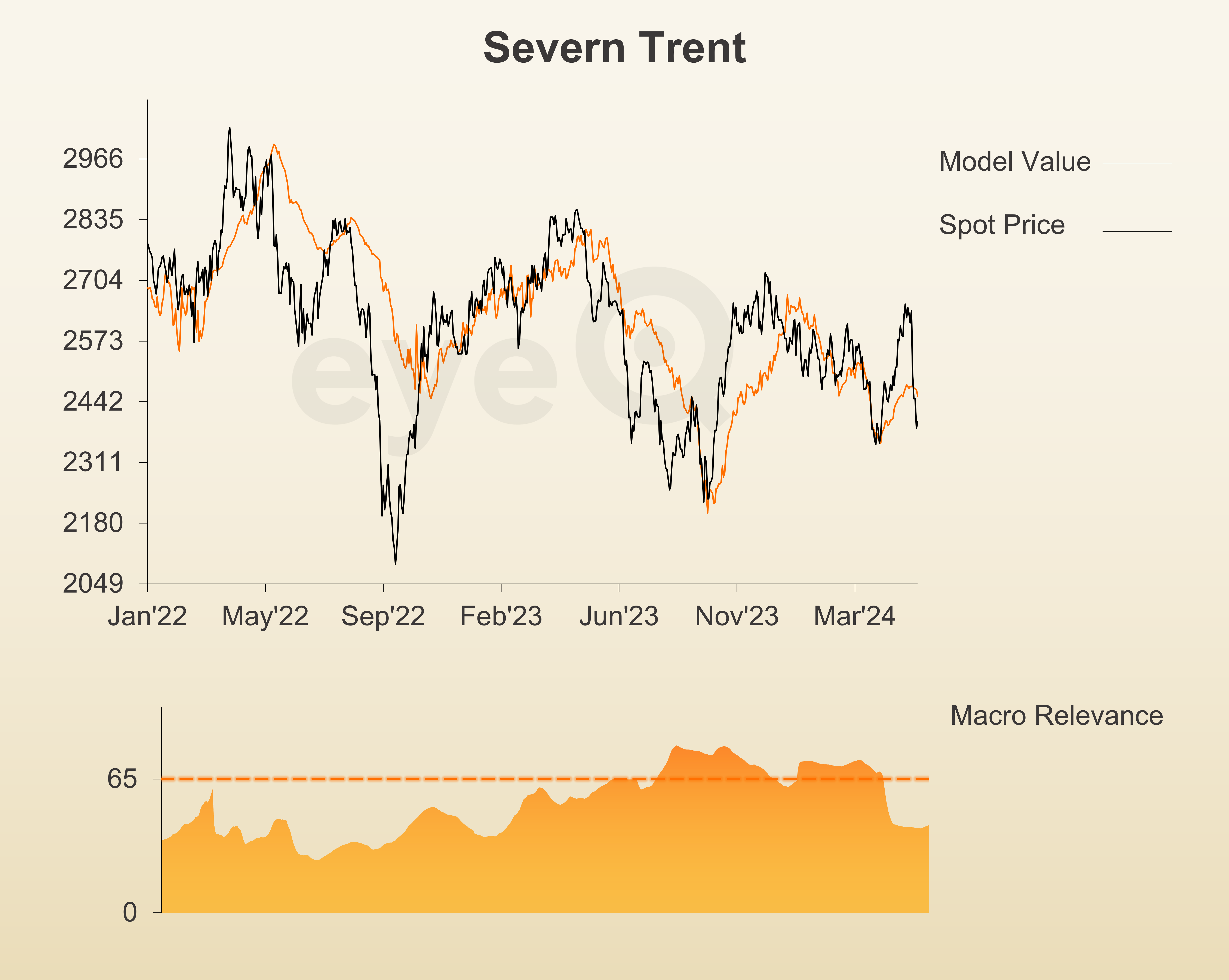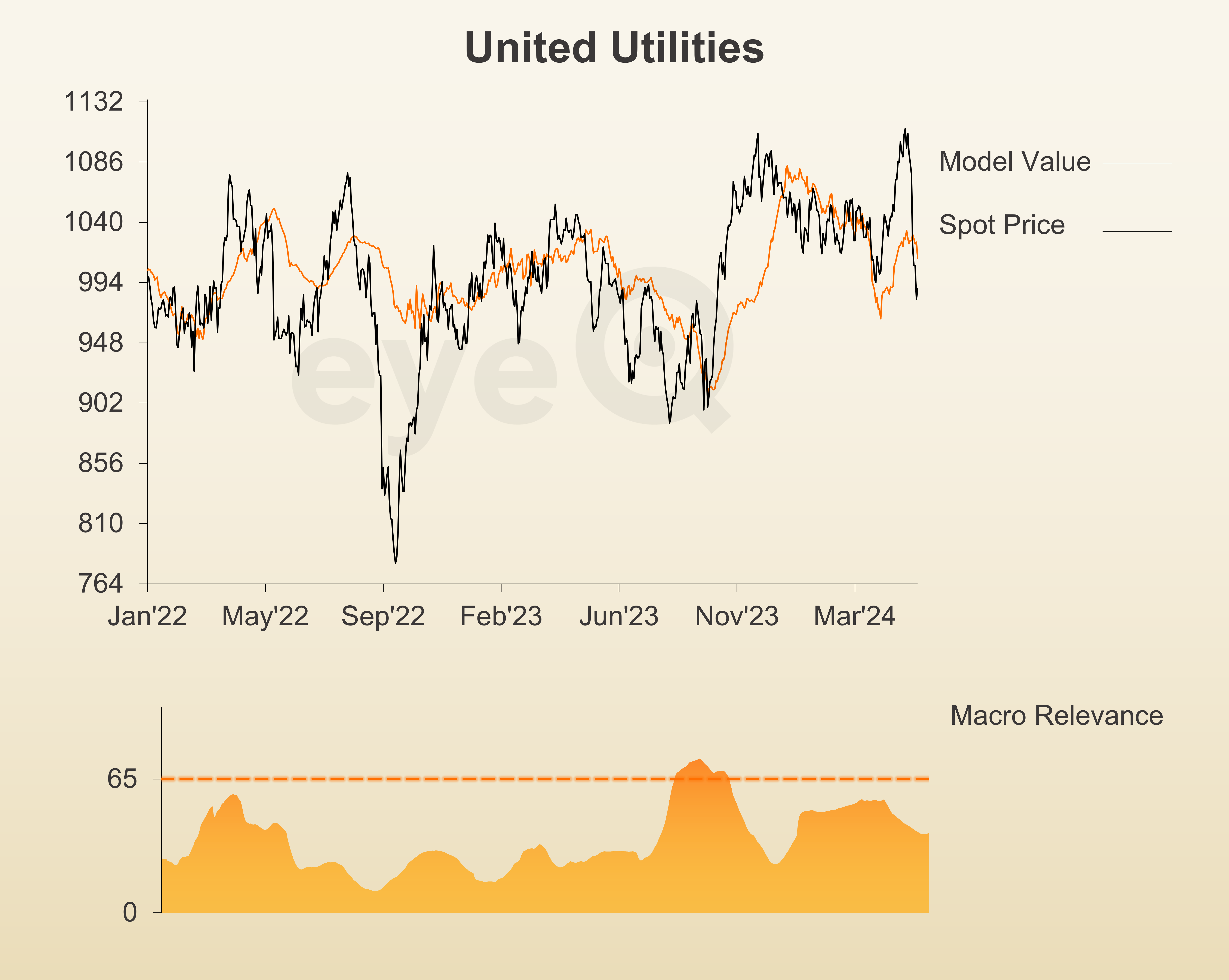eyeQ: UK water stocks – sink or swim?
interactive investor has teamed up with the experts at eyeQ who use artificial intelligence and their own smart machine to analyse macro conditions and generate actionable trading signals. This time it analyses two utilities stocks.
29th May 2024 10:08
by Huw Roberts from eyeQ

"Our signals are crafted through macro-valuation, trend analysis, and meticulous back-testing. This combination ensures a comprehensive evaluation of an asset's value, market conditions, and historical performance." eyeQ
- Discover: eyeQ analysis explained | eyeQ: our smart machine in action | Glossary
Severn Trent
Trading signal: long-term strategic model
Model value: 2,455.05p
Fair Value Gap: -2.29% discount to model value
Model relevance: 43%
United Utilities
Trading signal: long-term strategic model
Model value: 1,013.18p
Fair Value Gap: -2.34% discount to model value
Model relevance: 39%
Data correct as at 29 May 2024. Please click glossary for explanation of terms.
It won’t be confirmed until mid-July but, if newspaper speculation is to be believed, UK water companies will not be allowed to jack up the prices they charge British consumers.
Industry regulator Ofwat has pushed its decision out to after the election on 4 July, but the early rumours are they’ll grant only a small portion of the bill increases that were asked for.
Inhibiting the ability of United Utilities Group Class A (LSE:UU.), Severn Trent (LSE:SVT) and Pennon Group (LSE:PNN) to hike prices is clearly a negative for their share prices, and the sector posted sharp drops yesterday.
While this is all about the regulator’s response to company specific issues around sewage dumping, parasites and the need for big investment projects, it is always worth checking in with the macro picture.
Looking across United Utilities and Severn Trent, there are some common findings:
- macro relevance is low – company/industry news is more important than big picture stuff such as when the Bank of England cuts base rates
- both water companies were trading rich to overall macro conditions. At the extreme in mid-May, United Utilities was 7.6% rich to macro conditions; Severn Trent was 6.9% rich versus eyeQ model value
- this week’s correction has seen these rich valuations correct. In fact, they’ve now overshot and both screen as cheap; although not yet cheap enough to prompt any bullish signals
- although model value comes with a health warning given low macro relevance, it is interesting to note the big trend in macro conditions. It varies by stock but in broad terms, macro conditions fell a lot between January and late April. But in May, eyeQ’s macro model value has started to base out and even recover a little.
eyeQ will only ever fire a signal when macro relevance is high. That means even if this sell-off extends further and these stocks get “too cheap” to model fair value, there won’t be a signal until our macro relevance score suggests big picture stuff such as growth and inflation are driving price action.
We’re not there yet. For now, it remains all about regulatory developments and company news. But contrarians might be starting to pay attention to these sharp falls.


Source: eyeQ. Past performance is not a guide to future performance.
Useful terminology:
Model value
Where our smart machine calculates that any stock market index, single stock or exchange-traded fund (ETF) should be priced (the fair value) given the overall macroeconomic environment.
Model (macro) relevance
How confident we are in the model value. The higher the number the better! Above 65% means the macro environment is critical, so any valuation signals carry strong weight. Below 65%, we deem that something other than macro is driving the price.
Fair Value Gap (FVG)
The difference between our model value (fair value) and where the price currently is. A positive Fair Value Gap means the security is above the model value, which we refer to as “rich”. A negative FVG means that it's cheap. The bigger the FVG, the bigger the dislocation and therefore a better entry level for trades.
Long Term model
This model looks at share prices over the last 12 months, captures the company’s relationship with growth, inflation, currency shifts, central bank policy etc and calculates our key results - model value, model relevance, Fair Value Gap.
These third-party research articles are provided by eyeQ (Quant Insight). interactive investor does not make any representation as to the completeness, accuracy or timeliness of the information provided, nor do we accept any liability for any losses, costs, liabilities or expenses that may arise directly or indirectly from your use of, or reliance on, the information (except where we have acted negligently, fraudulently or in wilful default in relation to the production or distribution of the information).
The value of your investments may go down as well as up. You may not get back all the money that you invest.
Equity research is provided for information purposes only. Neither eyeQ (Quant Insight) nor interactive investor have considered your personal circumstances, and the information provided should not be considered a personal recommendation. If you are in any doubt as to the action you should take, please consult an authorised financial adviser.
Disclosure
We use a combination of fundamental and technical analysis in forming our view as to the valuation and prospects of an investment. Where relevant we have set out those particular matters we think are important in the above article, but further detail can be found here.
Please note that our article on this investment should not be considered to be a regular publication.
Details of all recommendations issued by ii during the previous 12-month period can be found here.
ii adheres to a strict code of conduct. Contributors may hold shares or have other interests in companies included in these portfolios, which could create a conflict of interests. Contributors intending to write about any financial instruments in which they have an interest are required to disclose such interest to ii and in the article itself. ii will at all times consider whether such interest impairs the objectivity of the recommendation.
In addition, individuals involved in the production of investment articles are subject to a personal account dealing restriction, which prevents them from placing a transaction in the specified instrument(s) for a period before and for five working days after such publication. This is to avoid personal interests conflicting with the interests of the recipients of those investment articles.